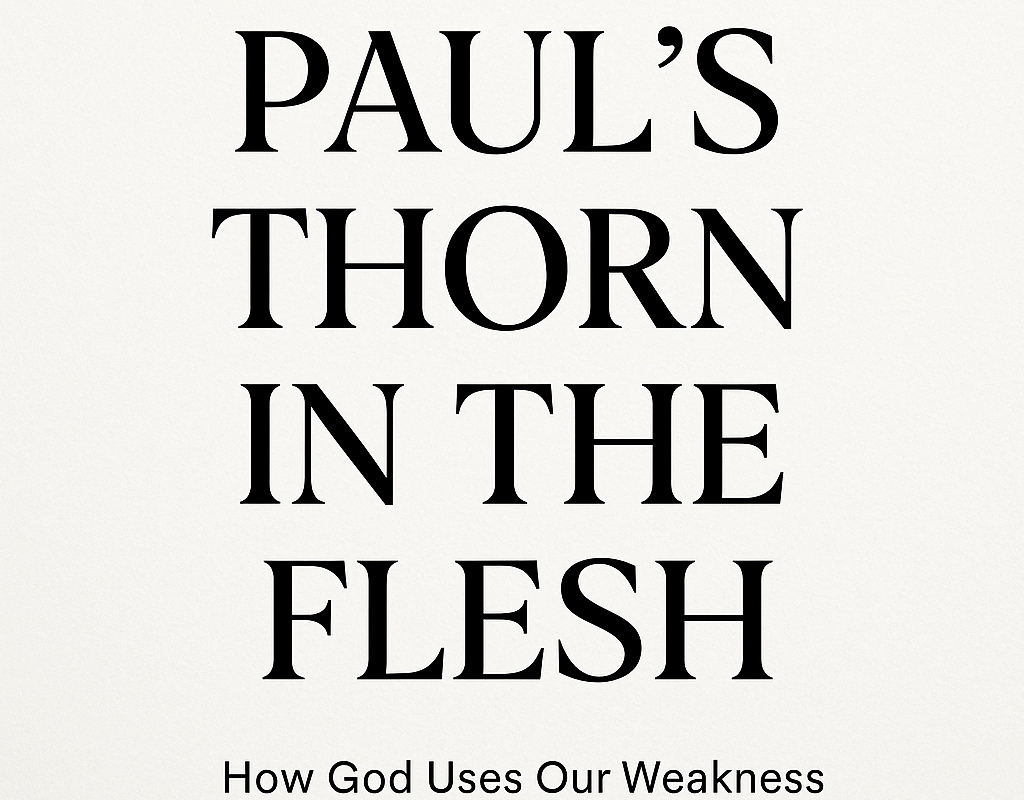Paul’s Thorn in the Flesh: How God Uses Our Weakness for His Strength
Understanding 2 Corinthians 12 about the mysterious “thorn in the flesh” and what it means for us today
Have you ever asked God to take away something painful in your life—only to hear silence? Or maybe you’ve prayed for healing, clarity, or relief from a burden, and instead, God allowed it to remain.
If so, you’re not alone.
The apostle Paul knew this struggle intimately. In one of the most raw and personal passages of the New Testament, Paul opens up about a mysterious “thorn in the flesh.” It’s a moment that gives us insight into suffering, strength, and how God often works in ways we don’t expect.
Let’s find out what the Bible says about Paul’s thorn in the flesh and how it still speaks to us today.
What Was Paul’s Thorn in the Flesh?
Paul writes about this thorn in 2 Corinthians 12:7-9 (NASB):
“Because of the extraordinary greatness of the revelations, for this reason, to keep me from exalting myself, a thorn in the flesh was given to me, a messenger of Satan to torment me—to keep me from exalting myself! I pleaded with the Lord three times that it might leave me. And He has said to me, ‘My grace is sufficient for you, for power is perfected in weakness.’”
So what exactly was Paul’s thorn in the flesh?
The truth is—we don’t know for sure. Scholars have speculated it could have been,
- a physical illness,
- poor eyesight,
- spiritual oppression,
- or even recurring persecution.
But Paul never gives us the specifics.
And maybe that’s intentional.
By leaving the thorn unnamed, Paul allows all of us to see our own suffering in his story—whether it’s physical pain, emotional wounds, anxiety, or a situation that just won’t go away.
Why Would God Allow Paul to Suffer?
It’s a hard question: Why would God allow someone as faithful as Paul to endure a thorn in the flesh?
Paul tells us himself—it was to keep him humble. He had received powerful revelations, seen miracles, planted churches, and written much of the New Testament. It would’ve been easy to become prideful.
But God used the weakness to remind him that the real power didn’t come from Paul—it came from God’s grace.
“My grace is sufficient for you, for power is perfected in weakness.” (2 Corinthians 12:9, NASB)
In other words, our weakness is not a liability. It’s the exact place where God’s strength can shine brightest.
What Can We Learn from Paul’s Thorn in the Flesh?
This passage isn’t just about Paul—it’s about us. Here’s how we can apply this teaching to our everyday lives.
1. You Don’t Have to Be Strong All the Time
We live in a culture that glorifies self-sufficiency. But the Bible reminds us that we’re not meant to carry everything alone. When we admit our weaknesses, we make room for God to show up in powerful ways.
2. God’s Silence Doesn’t Mean He’s Absent
Paul pleaded three times for God to remove the thorn. God didn’t say yes—but He did respond. He gave Paul something better: grace.
If you pray and God remains silent, remember—He’s still at work. His “no” or “not yet” might be His way of growing your faith or shaping your character.
3. Your Struggle Can Be Your Ministry
Paul’s thorn didn’t disqualify him—it strengthened his testimony. In fact, Paul’s vulnerability became a powerful part of his message.
Your story—with all its imperfections and pain—can encourage someone else. You don’t need to be perfect to be used by God.
Embracing the Thorn
We all have our own “thorn in the flesh.” Whether it’s a lingering illness, a personal struggle, or emotional pain, it can feel like a roadblock. But when we work for God, our weakness is the very place where His power is made perfect.
As Paul concludes in 2 Corinthians 12:10 (NASB):
“Therefore I delight in weaknesses, in insults, in distresses, in persecutions, in difficulties, in behalf of Christ; for when I am weak, then I am strong.”
So the next time you feel weak, discouraged, or burdened—remember Paul. And remember that God’s grace is not just enough—it’s everything!
In Christ,
Bob
Discover more from Making Christ Known
Subscribe to get the latest posts sent to your email.
